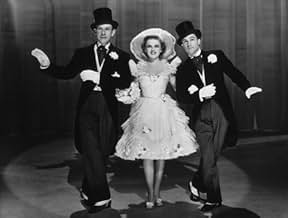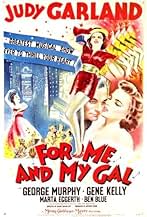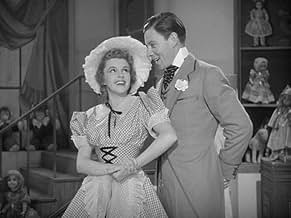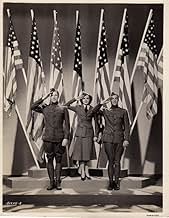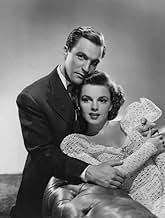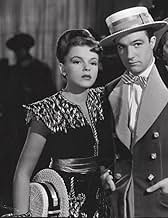IMDb-BEWERTUNG
7,0/10
4039
IHRE BEWERTUNG
Füge eine Handlung in deiner Sprache hinzuTwo vaudeville performers fall in love, but find their relationship tested by the arrival of WWI.Two vaudeville performers fall in love, but find their relationship tested by the arrival of WWI.Two vaudeville performers fall in love, but find their relationship tested by the arrival of WWI.
- Für 1 Oscar nominiert
- 4 Gewinne & 1 Nominierung insgesamt
Mártha Eggerth
- Eve Minard
- (as Marta Eggerth)
Stephen McNally
- Mr. Waring
- (as Horace McNally)
Ernie Alexander
- Theater Workman with Big Die
- (Nicht genannt)
Hooper Atchley
- Assistant Stage Manager
- (Nicht genannt)
Walter Baldwin
- Bill
- (Nicht genannt)
Gurney Bell
- Member - Sportsmen Quartet
- (Nicht genannt)
John Breen
- Soldier
- (Nicht genannt)
Ken Darby
- Member - The King's Men
- (Nicht genannt)
George Davis
- France Taxi Driver
- (Nicht genannt)
Bill Days
- Member - Sportsmen Quartet
- (Nicht genannt)
John Dilson
- Lou
- (Nicht genannt)
Jon Dodson
- Member - The King's Men
- (Nicht genannt)
Lester Dorr
- Stage Manager
- (Nicht genannt)
Ruth Dwyer
- Nurse
- (Nicht genannt)
Empfohlene Bewertungen
Gene Kelly makes his film debut opposite Judy Garland in this film about vaudeville acts trying to make it big and falling in love too. They start off as partners in a vaudeville act but of course, they fall in love. The story takes place on the verge of American involvement in World War I. Judy's Jo Hayden is an aspiring singer who helps her kid brother study at medical school. When the war breaks out in Europe, he enlists. Just as things were getting good with a marriage and performing at the infamous Palace Theatre in New York City, bad news occurs which separates these two star-crossed lovers. World War I becomes a top priority as does cheering the spirits of the men who go off to battle. The songs and dance numbers are what makes the film. The story is weak but Garland and Kelly's acting talents bring it alive to the audience. The dance and singing sequences are worth watching for any Judy Garland fan. Supporting cast is first rate.
Gene Kelly makes his smashing screen debut in For me and my gal. That alone should make it a must see. This movie was a delight for numerous reasons. First, I like the fact that this movie was a musical/drama. So, we were able to get a full dose of the manifold talents of Gene Kelly and Judy Garland. Second, the chemistry that Judy and Gene had in this movie was exceptional. The scene in which they are singing the title song is riveting. George Murphy was solid in his role as the amiable friend and colleague, who was a good example of selflessness.
This movie is not as renowned as other Garland classics such as the wizard of Oz and Meet me in St. Louis. However, I think this was her most endearing role. She was beautiful, sweet and vivacious in this movie. I can watch this movie repeatedly, and so should everyone else.
This movie is not as renowned as other Garland classics such as the wizard of Oz and Meet me in St. Louis. However, I think this was her most endearing role. She was beautiful, sweet and vivacious in this movie. I can watch this movie repeatedly, and so should everyone else.
If this movie was simply Gene Kelly and Judy Garland exchanging quips (the "Hello Springtime!" bit is especially good) and singing and dancing in a coffee shop, then it would still be entertaining. But that's really not all it is. This movie is more like a drama/romance than a musical, in the way that there are some songs, very good ones, but there is more story than numbers. Yes, the idea is an old one, but there are a few twists that distinguish it from any other wartime romance. (Don't go expecting The Maltese Falcon though.) The little plot weaknesses are forgotten as the actors (particularly Garland) hold it all together. I cried twice, and I almost never cry at movies. I fully recommend For Me and My Gal, unless you're dead-set on a tear-free day.
I thought Judy Garland gave an Oscar worthy performance in this movie. As for Gene Kelly, it was hard to believe that this was his movie debut, his acting made it seem as if he'd been around Hollywood for years. And oh, that musical score, remeniscent of some film scores by Irving Berlin. Not just your ordinary musical, this one has a fine story that fits in with the time of World War One. The title song as done by Garland & Kelly is a classical show-stopper. For sentimentalists, like my wife and I, there are a few scenes that tug at the heart strings, and provide for some misty eyes.
This was Gene Kelly's first foray into film, thanks to Judy Garland. Judy herself is only three years beyond "The Wizard of Oz" and at the top of her talents. Their pairing alone makes this a film worth seeing. Now, when we hear their voices harmonizing---especially in the title song---it feels iconic.
This is really two films joined together. The first part is the story of vaudeville, and an opening dedication page says that. As their characters, Jo and Harry, meet, team up and struggle to make the big time, the viewer is regaled by song and dance, specialty acts and vaudevillian humor. George Murphy plays the part of Jimmy Metcalf, who winds in and out of their lives.
The action takes place in 1916, just before the U. S. enters WWI. When the RMS Lusitania is sunk, the tenor and style of the film changes. Audiences in 1942 could identify with the patriotic fervor depicted, and it stimulated their nationalistic impulses to buy war bonds, participate in various drives, and forgo many luxuries. The second section of the film, much of which is a montage, is designed to stir up a unified American response to the Axis powers. So, there is no discussion of isolationism or Washington's warnings against foreign entanglements, though they might have been authentic.
In that second section, Jo and Harry's story is secondary to the bigger national story, but it is still there. Unfortunately, the dramatic transition between the two parts is thematically disruptive. It's a criticism that filmgoers of the forties would not have lodged. The review by the New York Times, in its roundabout way, does find fault with the script and its tale of two stories.
Martha Eggerth, the soaring soprano, plays a small role that is notable because she seldom appeared in films west of the Atlantic.
This is a film worth seeing, especially as an example of wartime cinema.
This is really two films joined together. The first part is the story of vaudeville, and an opening dedication page says that. As their characters, Jo and Harry, meet, team up and struggle to make the big time, the viewer is regaled by song and dance, specialty acts and vaudevillian humor. George Murphy plays the part of Jimmy Metcalf, who winds in and out of their lives.
The action takes place in 1916, just before the U. S. enters WWI. When the RMS Lusitania is sunk, the tenor and style of the film changes. Audiences in 1942 could identify with the patriotic fervor depicted, and it stimulated their nationalistic impulses to buy war bonds, participate in various drives, and forgo many luxuries. The second section of the film, much of which is a montage, is designed to stir up a unified American response to the Axis powers. So, there is no discussion of isolationism or Washington's warnings against foreign entanglements, though they might have been authentic.
In that second section, Jo and Harry's story is secondary to the bigger national story, but it is still there. Unfortunately, the dramatic transition between the two parts is thematically disruptive. It's a criticism that filmgoers of the forties would not have lodged. The review by the New York Times, in its roundabout way, does find fault with the script and its tale of two stories.
Martha Eggerth, the soaring soprano, plays a small role that is notable because she seldom appeared in films west of the Atlantic.
This is a film worth seeing, especially as an example of wartime cinema.
Wusstest du schon
- WissenswertesGene Kelly's film debut. It is known that Judy Garland got him the job after seeing him in the Broadway musical "Pal Joey". Kelly made films in a variety of genres over the next few years but became best known for his energetic dancing style in MGM hits such as Urlaub in Hollywood (1945), Das ist New York (1949), and Ein Amerikaner in Paris (1951). Kelly, who was a choreographer and director as well as a dancer and singer, received a special Academy Award in 1951 in recognition of his outstanding achievement as an actor, dancer, singer and director. He also received a Life Achievement Award from the American Film Institute in 1985. The song "For Me and My Gal" became one of Kelly's signature songs.
- PatzerJo's YWCA uniform (like much of her clothing in the latter half of the film) is characteristic of World War II, when the film was released, and not World War I, in which it is set. Her uniform's shoulders are too broad and the skirt too short, and she is wearing sheer stockings and pumps instead of opaque stockings and high boots or oxfords.
- Zitate
Harry Palmer: Why didn't you tell me I was in love with you?
- Crazy CreditsA picture of an infantry soldier in New York harbor and the text "America needs your money. Buy war bonds and stamps at this theatre."
- Alternative VersionenThere is a 1993 colorized version of the film that aired on TNT
- VerbindungenEdited into American Masters: Gene Kelly: Anatomy of a Dancer (2002)
- SoundtracksFor Me and My Gal
(1917) (uncredited)
Music by George W. Meyer
Lyrics by Edgar Leslie and E. Ray Goetz
Played during the opening credits and often as background music
Played on piano (with background orchestra) by Judy Garland (uncredited) and sung and danced by her and Gene Kelly (uncredited)in a coffee shop
Reprised by Judy Garland (uncredited), Gene Kelly (uncredited) and chorus at the end
Top-Auswahl
Melde dich zum Bewerten an und greife auf die Watchlist für personalisierte Empfehlungen zu.
- How long is For Me and My Gal?Powered by Alexa
Details
- Erscheinungsdatum
- Herkunftsland
- Sprachen
- Auch bekannt als
- Me and My Gal
- Drehorte
- Produktionsfirma
- Weitere beteiligte Unternehmen bei IMDbPro anzeigen
Box Office
- Budget
- 802.000 $ (geschätzt)
- Laufzeit1 Stunde 44 Minuten
- Farbe
- Seitenverhältnis
- 1.37 : 1
Zu dieser Seite beitragen
Bearbeitung vorschlagen oder fehlenden Inhalt hinzufügen

Oberste Lücke
By what name was For Me and My Gal (1942) officially released in India in English?
Antwort


